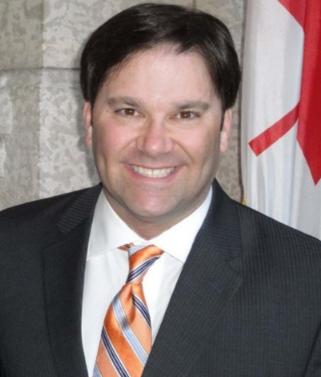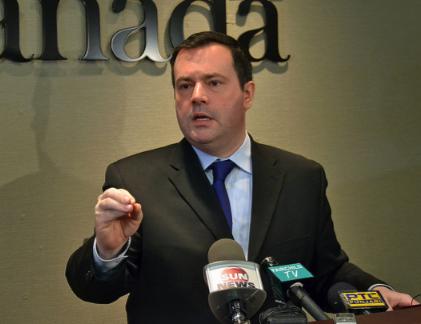
NDP immigration critic Don Davies says the government's latest reform bill is a step backward.

A group of gay asylum seekers in Paris recently profiled by Xtra. Credit: Barbara Laborde

Liberal immigration critic Kevin Lamoureux says just because a country is democratic does not mean gay people are protected. Credit: Barbara Laborde
The Conservative government’s latest refugee reform bill is seen by opposition parties as a betrayal of the good faith in which all parties operated during the last Parliament to get the previous bill passed. At the time, Immigration Minister Jason Kenney praised the bill, saying it was stronger and fairer for refugees.
But that bill never came into force, and the Conservatives won a majority government.
The new bill, C-31, called the Protecting Canada’s Immigration System Act, was introduced by Kenney on Feb 16 and restores planned reforms to the original version of the previous bill.
“To be blunt, Canada’s asylum system is broken,” Kenney told reporters immediately after tabling the bill. “[The previous] act went a long way to addressing problems in our system, but it’s become clear that there are still some gaps, and further reforms are needed. We need stronger measures that are closer to the original bill that we had tabled back in March of 2010.”
But critics find plenty of fault with the new bill.
NDP immigration critic Don Davies considers it a “serious step backward” for the refugee system.
“First, this bill once again puts too much power in the hands of the minister,” Davies says. “Second, what Canadians will find most troubling about this bill is that it goes against the fundamental ideal of the rule of law in Canada. This is an attitude that we’re seeing creep in to many parts of the Harper government’s approach to lawmaking, and I think it’s most disturbing. Third, this bill politicizes a process that should be judicial . . . it must be impartial, fair and arm’s length.
“Importantly, the minister never even implemented [the previous bill],” Davies says. “He never even gave it a chance to work. Why is that?”
Unpacking the rhetoric
Kenney has recently repeated a few consistent messages that don’t necessarily reflect the reality of the refugee situation, both in Canada and abroad.
He often notes that in 2011, Canada received more refugee claimants from Europe (30 percent) compared to sub-Saharan Africa (16 percent) or Asia (22 percent).
But what about the realities of travel and visa restrictions?
“The cost and logistics of travel from South Asia, from the Middle East, from East Africa . . . to Canada are more costly and more cumbersome,” says James Milner, an assistant professor of political science at Carleton University.
Milner, who studies global refugee issues, points out that for Somalis, it is more feasible to make the perilous boat trip across the Gulf of Yemen to try to seek protection than to consider a Canadian alternative.
Milner says Kenney is borrowing rhetoric from Australia and the UK when he speaks about a perceived mismatch between those nationalities claiming asylum in Canada and global refugee statistics.
He notes that restrictive policies in those countries have not worked and have eroded their authority in the UN refugee system.
Milner also highlights the mixed message Canada sends when it tries to restrict asylum protections at home, while encouraging countries like Tanzania to accommodate Burundian refugees.
“Countries like Tanzania can look at what Canada’s asking it to do and say, If you’re adopting a more restrictive policy at home, then why should we adopt a more progressive policy here?” Milner says.
Rob Shropshire, interim executive director of the Canadian Council of Refugees notes that Africa’s visa offices are understaffed and few and far between.
“They’ve done a very good job of preventing people to come to claim refugee status from other parts of the world, whereas people travelling from Europe, it’s easier to do,” he says. “There’s no visa requirement for almost all European nationals in terms of coming to Canada.”
The Rainbow Refugee Committee’s Chris Morrissey agrees, noting that lack of access means Canada accepts very few refugees from those countries where queer people are persecuted.
“I’ve just been emailing with two brothers from Nigeria, and one of the two brothers has attempted suicide several times already,” Morrissey says. “They’re still in Nigeria. Even if they get out of Nigeria, they could be sitting for several years, and refugee camps are not the safest place for members of our community either. There is that restriction on visas for people from those parts of the world that are most in need of protection.”
There are also concerns with regard to gay claimants from Mexico.
“We have heard from people at the border and elsewhere who say, ‘Look at Puerto Vallerta, look at the Zona Rosa in Mexico City’ – why wouldn’t they go there? Why do they need to come to Canada?” says Shropshire, noting that socio-economic status is significant and poor gay people are less safe in those places.
Milner also points to a 2003 United Nations High Commission for Refugees (UNHCR) report that states that there is no basis in law for pointing to internal flight as a grounds for denying refugee status.
“That is the international standard, and this is the standard to which Canada has subscribed – that if an individual has a well-founded fear of persecution, that is the benchmark of being recognized as a refugee,” Milner says, adding that the guidelines do not require threatened individuals to exhaust all other options before seeking asylum.
As for Kenney’s tendency to lump rejected, abandoned and withdrawn refugee claims into statistics designed to prove his point that the system is clogged with false applications, Shropshire says the three are very different.
Abandoned claims are those where the person has disappeared, while withdrawn claims mean a person has told the government they are abandoning the claim, whereas rejected claims have been heard and refused by the Immigration and Refugee Board (IRB).
Designating “safe” countries of origin
Under the previous act, this list of Designated Countries of Origin (DCO) – those countries considered “safe” and nominally democratic – was to be determined by an expert panel that would then advise the minister. C-31 puts that power solely in the hands of the minister, which critics argue removes the protection of due process.
“There’s still persecution that occurs in democratic countries, and that’s the reason why it is wrong for the minister to take it upon himself to make the determination as to which country is a safe country,” says Liberal immigration critic Kevin Lamoureux. “Someone could be a gay activist in one of these countries in fear of his or her life, and now, because it’s listed as a safe country, is not going to get an appeal mechanism.”
Claimants from a DCO would have an expedited hearing and be denied access to the new Refugee Appeal Division (RAD). They may still apply to the Federal Court for a judicial review of the IRB decision on their claim but have no automatic stay from being deported in the interim.
“I have absolutely zero confidence in the minister’s ability to make good decisions in that regard,” Lamoureux says. “I would feel a lot better if we had distinguished individuals who are familiar with human rights issues bringing forward those recommendations to the government.”
Kenney says the alternative process to designate countries would have taken months, noting the department needs the ability for fast and flexible determinations to deal with sudden influxes of claims.
Peter Showler, director of the refugee forum at the Human Rights Research and Education Centre at the University of Ottawa, calls Kenney’s claim “nonsense.”
“What we’ve seen again and again, quite frankly, in terms of time management is a fundamental hypocrisy,” he says.
The shortened timelines across the board will make it difficult for all refugee claimants but especially those from DCOs. Shropshire says for gay people or women fleeing violence, it can be hard to talk about their personal circumstances upon arrival.
“Quite often if they’ve been victims of violence, it can be quite humiliating to try and talk about this in front of strangers,” Shropshire says. “We’ve seen cases in the past where people have come in, gone through the process, haven’t talked about those experiences, and their claim has failed. It’s only afterwards that they’ve opened up to someone out of desperation that they’ve told what actually happened to them, and then we could always go for the humanitarian and compassionate [H&C] grounds at least.
“These people will be banned from any appeal, and even now if you try to use [H&C] provisions in the law, the government can still deport you in the meantime,” Shropshire says. “You’re banned for a year in applying for permanent residence under the new provisions.”
Shropshire is also concerned DCO designations may become a diplomatic bargaining chip.
“They won’t be taking an objective look at what is the situation in any given country, but instead, putting it in the hands of the minister means that they will also be looking at what is Canada’s relationship with that particular country,” Shropshire says.
The Canadian Council of Refugees has stated that a better way of addressing claim influxes is to authorize the minister to identify a limited number of claims and require the IRB to hear them on a priority basis.
“That means that they would be able to turn those claims around more quickly, and if there was a sense that there were people seeking to abuse the system, then the message would get out more quickly that they wouldn’t be accepted here in Canada,” Shropshire says.
Limiting appeals
Because DCO claimants have limited appeal options, critics also worry that the refugee process will become two-tiered. Because of the shorter timelines for refugee hearings, the necessity for a proper appeals mechanism becomes even more important, Showler argues.
Under the new rules, a written submission must be made upon arrival for an inland claim, and within 15 days at port of entry.
“Any refugee advocate or anybody that understands the refugee business will tell you that 15 days is not enough time,” Showler says. “You just walk out of Pearson Airport, you don’t speak English or French, you’ve maybe got a cousin in town, you’ve got to find a place to stay for you and your family, you’ve then got to try and find some form of legal advice.”
Showler says written submissions delivered to the IRB will be of poor quality that won’t reflect the full relevant information for the claim; hearings will subsequently be disorganized as new information is exposed.
“It increases the possibilities that in actuality the board will make a mistake,” Showler says. “They will focus on inconsistencies, when in actuality the inconsistencies wouldn’t be there if the person had actually had time to prepare their story in the first place. It’s going to gum up the entire system because if there’s poor credibility analysis and a focus on inconsistency, that in turn gets passed on the appeal process.”
But for claimants from DCOs, there is no appeal process and no automatic suspension of removal orders so claimants can apply for leave from the Federal Court.
“The Federal Court may in fact overturn the decision, but the person has most likely been sent back to the country where they have been in danger,” says Morrissey. “That is not a timely access to justice.
“It’s a token access, but we’ve heard for a long time how a number of politicians, as well as people in the country, always cite how many opportunities refugees have for ‘appeal,’ and that keeps them in the country for many years,” Morrissey says. “Up until this point, there has never been a right to appeal. People go to the Federal Court, and those people who are wealthy enough to go through that process may have access to that level; however, that’s not an appeal.”
Showler says one positive change incorporated to the new bill is the ability for claimants to withdraw their refugee claim and apply for H&C grounds if they have not yet had their hearing.
Some claimants may have a stronger connection to Canada through relatives, he says, but may not fall within the refugee definition despite being at risk; such claimants may have a better chance at an H&C claim.
Previously they had to make a decision upon arrival without knowing the system properly. “If they can change horses, that’s positive,” Showler says.
Kenney has indicated he wants the bill passed before June 29 so government can avoid making changes dictated by the implementation of the previous act.
Despite these widespread concerns about the new bill, critics say there’s not much that can be done to stop it.
“They’re holding all the cards,” says Liberal House Leader Marc Garneau. “Or just about all the cards.”


 Why you can trust Xtra
Why you can trust Xtra


